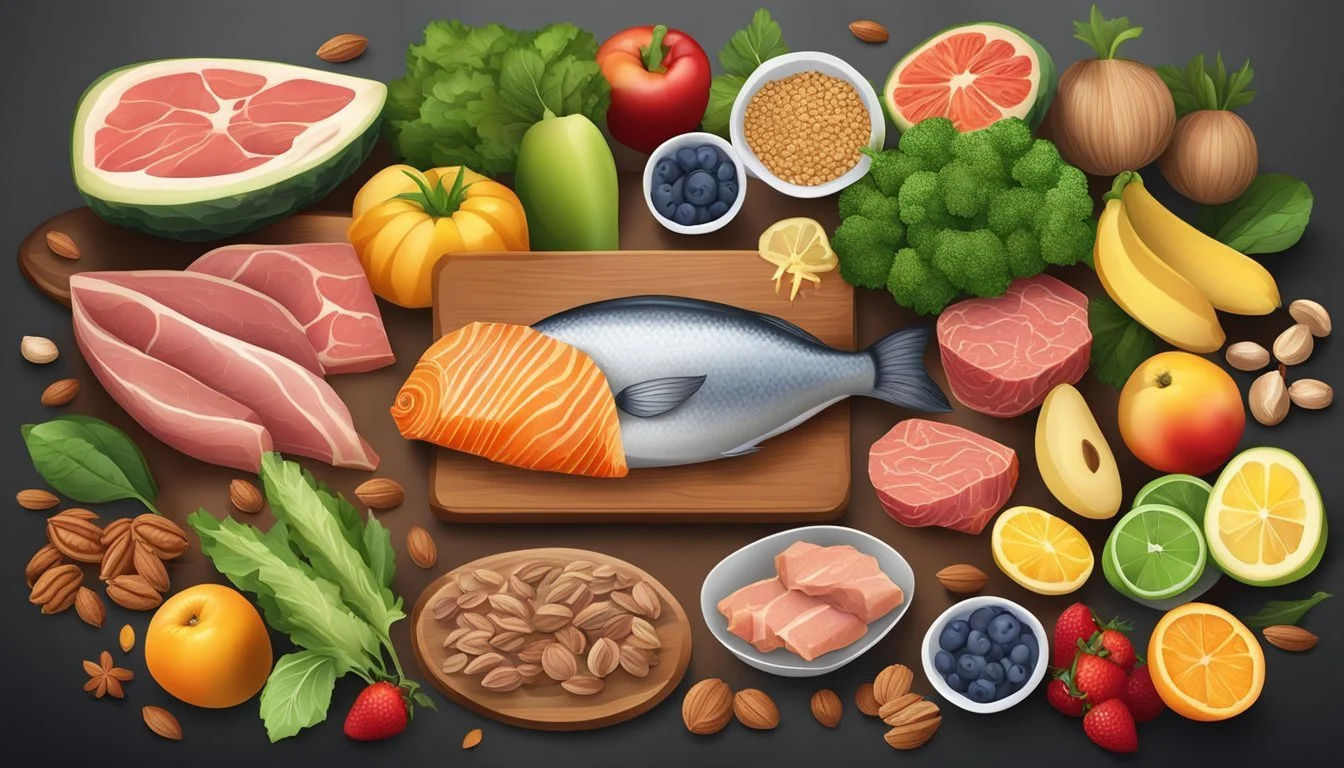Carnivore Diet vs. The Engine 2 Diet
Evaluating Meat-Based Versus Plant-Strong Nutrition
When examining contemporary diets, two divergent approaches generate considerable debate: the Carnivore Diet and The Engine 2 Diet. The Carnivore Diet, as its name implies, is an all-meat regimen that posits meat as the optimal source of nutrition for human health. Proponents assert that a meat-only diet leads to benefits such as weight loss and reduced inflammation, drawing on the evolutionary argument that humans are naturally carnivorous.
Conversely, The Engine 2 Diet champions a plant-strong eating pattern, which advocates for the exclusive consumption of whole, plant-based foods. Created by former firefighter Rip Esselstyn, the Engine 2 Diet excludes all animal products, processed foods, and added oils. It emphasizes fruits, vegetables, legumes, whole grains, nuts, and seeds as dietary staples. Research suggests that following a plant-based diet like Engine 2 can lead to lower rates of heart disease, type 2 diabetes, and some cancers.
As individuals navigate the landscape of personal health and nutrition, understanding the philosophical and practical differences between these diets can be crucial. Engaging with the Carnivore and Engine 2 Diet helps to reveal broader discussions about dietary sustainability, health outcomes, and the complexities of human nutrition. Through a comparative analysis, this article seeks to offer insight into how each diet operates within these frames of reference.
Dietary Philosophies
When comparing the Carnivore Diet with The Engine 2 Diet, it is essential to understand the foundational principles of these vastly different eating patterns. The former exclusively emphasizes animal proteins, while the latter is rooted in plant-based nutrition.
Understanding the Carnivore Diet
The Carnivore Diet is a meat-centric eating plan that encourages the consumption of animal products and eliminates plant-based foods. Proponents believe that by focusing on meat, one can gain nutritional benefits such as a higher intake of protein and certain vitamins and minerals found in animal flesh. This diet typically includes:
All types of meat: beef, chicken, pork, lamb, organ meats, etc.
Animal products: eggs, lactic products such as cheese and butter (though some versions recommend excluding dairy).
Zero plant-based foods: no fruits, vegetables, nuts, seeds, or grains.
Principles of The Engine 2 Diet
The Engine 2 Diet promotes a vegan lifestyle by incorporating a variety of plant-based foods. It stands against the consumption of any animal products. Developed by a former firefighter, this diet is designed to improve health markers such as cholesterol levels and blood pressure. Central to this diet are the following guidelines:
Whole, plant-based foods: fruits, vegetables, legumes, whole grains, nuts, and seeds.
No animal products: no meat, dairy, or other animal-derived substances.
Nutrient-dense meals: focus on vitamins, minerals, and plant proteins.
Low in fat and processed foods: avoiding added oils and refined products.
Health Impacts
When comparing the carnivore diet and the Engine 2 Diet, one must consider their potential health impacts, including their nutritional content and the risks and benefits associated with chronic diseases.
Nutritional Benefits and Risks
Carnivore Diet:
Nutrients: Rich in protein and certain vitamins such as B12.
Risks: Potentially high in saturated fat and cholesterol, which could impact heart health.
Engine 2 Diet:
Nutrients: High in dietary fiber, vitamins, and minerals.
Risks: May require careful planning to ensure adequate intake of all essential nutrients, particularly protein and B12.
Carnivore Diet and Chronic Diseases
The carnivore diet, which emphasizes consumption of only animal products, poses certain concerns regarding chronic diseases:
Heart Disease: High saturated fat and cholesterol intake can be associated with an increased risk.
Hypertension: Consuming high levels of red and processed meat has been linked to higher blood pressure.
Diabetes: There is mixed evidence regarding meat consumption and diabetes risk; some studies suggest high meat intake might increase the risk.
Plant-Based Diets and Disease Prevention
Conversely, the Engine 2 Diet, a plant-based eating plan, is associated with several protective benefits against chronic diseases:
Cardiovascular Health: Low in saturated fat and high in fiber, which is beneficial for heart health.
Blood Pressure: Plant-based diets can lead to reductions in blood pressure, reducing the risk of hypertension.
Chronic Diseases: Generally associated with a lower risk of heart attacks, strokes, and some forms of diabetes.
Nutritional Components
When comparing the Carnivore Diet and The Engine 2 Diet, one must consider how each diet sources essential nutritional components, such as proteins, vitamins and minerals, as well as fiber and antioxidants.
Protein Sources Comparison
Carnivore Diet:
Protein sources are exclusively from animal products: includes meats, organs, and dairy.
High in complete proteins containing all essential amino acids.
Engine 2 Diet:
Protein derived from plants: includes nuts, seeds, legumes, and whole grains.
Sometimes requires combining foods to ensure intake of all essential amino acids.
Vitamin and Mineral Content
Carnivore Diet:
Rich in vitamin B12, zinc, and iron, which are abundant in red meat.
May lack in certain minerals and vitamins found in plants unless organ meats are regularly consumed.
Engine 2 Diet:
Plant-based diet offers a wide range of vitamins and minerals from fruits, vegetables, beans, and grains.
Supplements or fortified foods often needed for vitamin B12.
Fiber and Antioxidants Analysis
Carnivore Diet:
Contains minimal to no fiber as it excludes plant-based foods.
Antioxidant intake reliant on the animal-based sources, which may be lower compared to plant-based diets.
Engine 2 Diet:
High in fiber from a variety of plant sources such as legumes, vegetables, and whole grains.
Rich in antioxidants, which are naturally found in plant-based foods like vegetables, fruits, nuts, and seeds.
Environmental and Ethical Considerations
The environmental and ethical implications of the Carnivore and Engine 2 diets are central to the decision-making process for those considering a diet change. These considerations carry weight in discussions on sustainability, health, and moral responsibilities.
Environmental Impact of Diets
Diets have a direct effect on environmental factors such as water usage, climate change contributors, and the management of toxins. Plant-based diets, like the Engine 2 Diet, typically require less water and produce fewer greenhouse gases compared to meat-centric diets. Beef and pork production especially has a high water footprint and contributes significantly to greenhouse gas emissions. In contrast, plant cultivation for human consumption generally results in a lower environmental impact, although practices vary by crop and methods used.
The production of animal-based foods, like those prominent in the Carnivore Diet, often leads to greater emissions of methane and carbon dioxide. Livestock such as cows not only use extensive land resources but are also associated with deforestation and habitat destruction, further exacerbating environmental concerns. Additionally, the accumulation of toxins in the food chain, notably in fish, poses a threat to ecosystems and can result in bioaccumulation of harmful substances in carnivorous humans.
Ethical Perspectives on Diet Choices
Ethical perspectives on diet choices can be quite personal and varied. Advocates of meat-only diets may face scrutiny over animal welfare, given that diets rich in meat like beef, chicken, pork, and especially processed meats such as bacon often involve industrial farming practices. These practices raise concerns about inhumane treatment of livestock and the ethical implications of killing animals for food when alternatives are available.
Conversely, proponents of plant-based diets argue that such eating habits could reduce the number of animals killed for food, aligning with a more ethical stance toward animal rights. However, ethical considerations also extend to crop cultivation practices, which can affect not only the environment but also local communities and wildlife. For instance, the displacement of natural ecosystems for crop production can raise ethical questions about land use and biodiversity loss.
Diet choices are not merely about personal health but also involve broader considerations that include the well-being of animals and the sustainability of food systems. Each dietary choice embodies a different set of ethical and environmental trade-offs that individuals must weigh against their values and the collective impact on the planet.
Lifestyle and Practical Aspects
Choosing between the Carnivore Diet and the Engine 2 Diet involves considering the practicality of each, including meal preparation, food availability, and the impact on one’s lifestyle.
Daily Meal Planning
The Carnivore Diet simplifies meal planning to primarily animal-based products—meats, eggs, and specific dairy items. A typical day might include bacon and eggs for breakfast, a turkey burger for lunch, and chicken thighs (What wine goes well with chicken thighs?) for dinner. In contrast, those following the Engine 2 Diet, which is vegan, plan meals around a variety of fruits, vegetables, legumes like lentils, and whole grains—often incorporating mushrooms, onions, and garlic to enhance flavor.
Breakfast: Scrambled eggs with bacon
Lunch: Chicken breasts with cheese
Dinner: Pork chops cooked in butter
Engine 2 Diet Meal Example:
Breakfast: Oatmeal topped with assorted fruits
Lunch: Brown rice with stir-fried veggies and tofu
Dinner: Lentil soup with a side of garlic-roasted mushrooms and onion
Accessibility of Foods
Access to a wide array of meats makes the Carnivore Diet fairly convenient in many places. On the other hand, the Engine 2 Diet requires access to fresh vegetables and fruits, plus staples like soy, tofu, and lentils. The availability of these products can vary greatly depending on one's location. Individuals may find that locality significantly impacts their ability to adhere to either diet.
Diet Sustainability and Lifestyle
The longevity of sticking with the Carnivore or Engine 2 Diet often depends on personal convictions and lifestyle choices. The Engine 2 Diet, with its abundance of veggies, lettuce, and use of olive oil in cooking, aligns with a plant-strong lifestyle and ethical vegan values. Conversely, the Carnivore Diet appeals to those who advocate for meat consumption's perceived benefits and those less concerned about high meat intake's environmental footprint. Each diet presents unique challenges in social settings, such as dining out or attending events, where meal options may not cater to such specific dietary frameworks.
Risks and Considerations
When evaluating the Carnivore Diet and The Engine 2 Diet, one must consider the potential health risks and necessary considerations, especially regarding long-term adherence and specific nutritional implications.
Potential Health Concerns
Carnivore Diet:
Sodium and Cholesterol: High intake of processed meats on this diet can lead to elevated levels of sodium and cholesterol, which are risk factors for hypertension and cardiovascular diseases.
Saturated Fat: Predominant consumption of animal fats increases saturated fat intake, potentially raising LDL cholesterol levels and affecting heart health.
Dehydration and Kidney Function: High protein content can cause increased water loss through urine, potentially leading to dehydration and increased burden on the kidneys.
Engine 2 Diet:
Caloric Deficiency: Since high-calorie beverages and foods are eliminated, individuals may inadvertently consume insufficient calories to meet their energy needs.
Nutrient Balance: Strict adherence without adequate planning could result in a lack of essential fatty acids or complete proteins, which are crucial for bodily functions and muscle maintenance.
Considerations for Special Populations
Individuals with existing health conditions or special dietary requirements should exercise particular caution when considering these diets.
Pregnant Women: Should be cautious as they require increased calories and nutrients, which can be challenging to obtain through restrictive diets like these.
Athletes: May find it difficult to sustain energy and strength levels on The Engine 2 Diet due to lower calorie intake, while the high saturated fat intake from the Carnivore Diet might not align with cardiovascular health goals.
Older Adults: Risk of dietary imbalances and associated health issues, such as elevated blood pressure and compromised bone health, may be amplified for older populations on these diets.
It's recommended that individuals considering either diet consult with healthcare providers to discuss risks and tailor the diet to their unique health needs.
Cultural and Social Factors
In the diverse landscape of dietary practices, the Carnivore and Engine 2 diets represent two extremes with distinct cultural and social implications, reflecting opposing philosophies on health, environmental impact, and ethical considerations.
Diet Trends and Popularity
The Carnivore Diet has gained visibility through figures like Joe Rogan and the promise of improved health by focusing solely on animal protein. This diet includes meat, fish, eggs, and certain dairy products, rejecting plant-based foods. The Engine 2 Diet, in contrast, advocates for veganism and the exclusion of all animal products, promoting plant-based food like vegetables, fruits, whole grains, and legumes, such as soy and tofu.
Carnivore Diet:
Popular among those prioritizing quick weight loss and muscle building.
Emphasized in various online communities and podcast discussions.
Engine 2 Diet:
Often chosen for health reasons, ethical concerns, and environmental sustainability.
Supported by a strong community of followers and a wealth of plant-based recipes.
Cultural Significance of Diet Choices
The consumption of animal protein versus plant-based food is more than a nutritional choice; it is deeply ingrained in cultural identity and personal values. Meat consumption is associated with tradition and festive occasions in many cultures, whereas veganism often represents a conscious decision aligning with environmental and ethical beliefs.
Carnivore Diet:
Perceived as high-status due to the historical cost and prestige associated with meat consumption.
Highlights polarized views on animal welfare and sustainable food sourcing.
Engine 2 Diet:
Aligns with a global shift toward Mediterranean and other plant-heavy diets that balance nutrients without gluten or animal products.
Reflects growing concerns over climate change and the environmental impact of livestock farming.
Scientific Evidence
In evaluating the Carnivore and Engine 2 diets, scientific evidence plays a pivotal role, offering insights on health impacts, nutrient profiles, and potential long-term effects.
Clinical Trials and Studies
Clinical trials and studies provide essential data on the Carnivore Diet, which is high in protein and fat but lacks fiber. Research indicates that diets high in saturated fat from animal sources can increase blood pressure and risk factors for atherosclerosis. Conversely, the Engine 2 Diet, rich in plant-based, whole foods, is typically high in fiber and nutrients while low in saturated fat. Plant-based diets are linked to lower blood pressure and improved heart health. Studies suggest that while individuals on a carnivorous diet may experience increased levels of certain nutrients like creatine, carnosine, and taurine, it may simultaneously lack other essential nutrients commonly found in plant foods.
List of nutrients and their common dietary sources in both diets:
Protein:
Carnivore: Animal meat
Engine 2: Legumes, nuts, and seeds
Fiber:
Carnivore: Not present
Engine 2: Fruits, vegetables, whole grains
Carnivore: Animal fat
Engine 2: Minimal presence
Creatine, Carnosine, Taurine:
Carnivore: Abundant in meat
Engine 2: Typically supplemented or present in lower amounts
Research on Long-Term Effects
Long-term effects of these contrasting diets are a significant point of interest for nutrition experts. The Carnivore Diet lacks scientific studies assessing its prolonged impact, so its long-term safety remains uncertain. However, the absence of dietary fiber and certain vitamins in a meat-only diet raises concerns about potential nutritional deficiencies and the body's overall well-being. On the flip side, the Engine 2 Diet has been associated with long-term health benefits, including the potential for reducing the risk of chronic diseases such as heart disease and type 2 diabetes, attributed to a diet rich in fruits, vegetables, and whole grains. Research supports that balanced plant-strong eating could contribute to sustained health and nutrition. These findings encourage continuing research on the compatibility of each diet with the human body's needs for maintaining optimal health over time.
Conclusion
The Carnivore Diet exclusively embraces meat consumption, foregoing plant-based foods. Proponents might argue for its potential in muscle-building due to its high protein content. However, it can raise concerns related to heart disease given its saturated fat levels, challenging its long-term viability for cardiovascular health.
In contrast, The Engine 2 Diet is a low-fat, plant-based regimen. Studies suggest that such diets can decrease the risk of chronic diseases, including heart disease. This diet aims to derive nutrition primarily from plants, which can have a positive environmental impact due to lower greenhouse gas emissions compared to meat production.
Environmental Considerations:
Carnivore Diet: High ecological footprint.
Engine 2 Diet: More sustainable.
Nutritional Components:
Carnivore Diet: Rich in protein; often low in fiber.
Engine 2 Diet: High in fiber; nutritional diversity from plants.
Each diet attracts individuals seeking different health outcomes. The Engine 2 Diet can potentially support heart health with its emphasis on whole, plant-based foods. Those looking to prioritize muscle mass might be drawn to the protein density of the Carnivore Diet, but should be attentive to its possible heart disease risks and environmental impact. Users should consult health professionals when selecting diets to align with specific health goals and nutritional needs.









